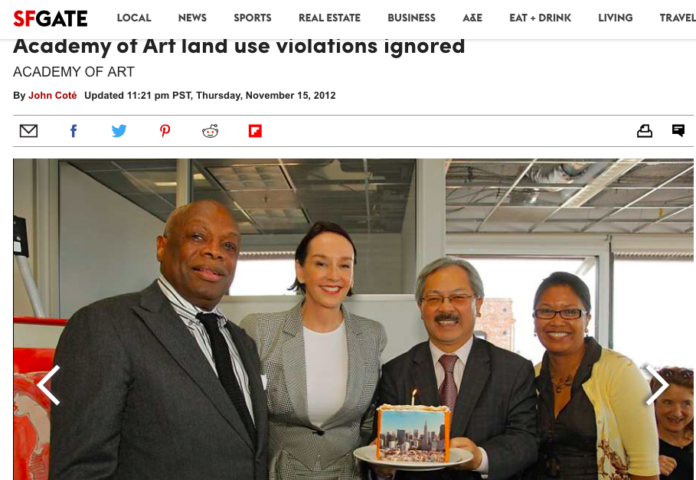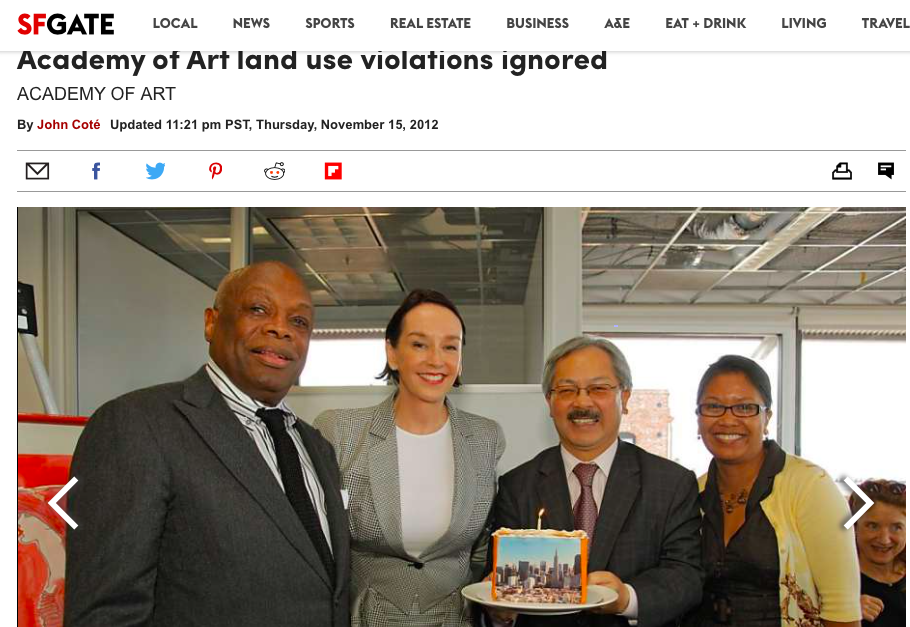
A settlement deal with one of the city’s worst planning scofflaws comes before the Government Audit and Oversight Committee tomorrow – but the case is far from over.
The City Planning Department allowed the Academy of Art University to operate outside the law for decades. The school illegally changed the uses of buildings, turned protected low-income housing into student dorms, crammed dozens of students into buildings that were not designed for that capacity, turned industrial space into classrooms, and more.

Finally, with a push from the City Attorney’s Office, the department started a process of cracking down.
And now the city attorney has reached a settlement with AAU, which would require the school to pay the city $58 million to the city, vacate nine properties that were used illegally, and bring the remaining 34 buildings it owns up to code.
Everyone at City Hall seems to be on board – except that the process largely leaves the public out.
The GAO committee will consider the deal in closed session. The only public hearing that will ever take place on the deal will be Monday/9at the Land Use and Transportation Committee.
The agreement requires the city to make amendments to the Planning Code and accept an institutional master plan.
This is a massive case, involving one of the city’s largest private landlords. But it’s moved along very quickly (in interestingly, one of AAU’s lawyers is Willie Brown, an ally of Mayor Breed, a Chronicle columnist, and a key political player in the city).
The master plan was released July 7, after a notice published July 3. The only hearing on it was July 25.
Since the master plan is a huge project, it requires an environmental impact report. One was completed in 2018 – before the city reached a settlement that changed the details of the plan.
The city added a new section to EIR, called an “addendum,” Oct. 9.
There has been no public hearing on that addendum.
In fact, it gets crazier: Under state law, anyone can appeal the Planning Commission’s approval of an EIR to the Board of Supes. But you can’t file that appeal until the project is approved.
In this case, the “project” – the massive master plan of AAU – hasn’t been approved because it’s been part of litigation. It can’t be approved until the supes sign off on the settlement deal and agree to the Planning Code changes.
Land-use lawyer Sue Hestor, who has been in the forefront of demanding that the city crack down on AAU for years, asked when the deadline is to appeal the EIR. Typically it’s 30 days after the first approval – which came at the Planning Commission Nov. 21.
But in an email, Deputy City Attorney Kristen Jensen told Hestor that there’s no room for appeal:
“The approvals for AAU are based on a CEQA addendum. Article 31 does not provide for an appeal of a CEQA addendum to the Board of Supervisors. And, the deadline for appealing the EIR has passed.”
What? The deadline has passed to appeal an EIR that is linked to a massive land-use deal settlement that hasn’t been approved by the supes?
UPDATE: The City Attorney’s Office sent me the following email saying that our description of the appeal process was wrong:
Your contention that “you can’t file that appeal until the project is approved” is not accurate. Ms. Hestor (or anyone else) could have appealed the EIR prior to project approval. Only negative declarations or categorical exemptions (neither of which apply here) require project approval before an appeal to the Board of Supervisors. So this section of your story is based on an inaccurate premise.
Hestor told me that the EIR was certified July 28, 2016, but that permits for numerous individual buildings involved in this settlement were still before the Planning Commission all through 2017 and 2018. “They had no project,” she said. “You can’t appeal if there is no project.”
She said, “They went from 40 buildings to 43 buildings while all of this was going on, and they weren’t in the EIR. Then went down to 34 sites. Now they are saying that they can change a project at will without changing the EIR, and there can be no public input.”
I can’t argue the law on this, but as a matter of policy, that seems really wrong.
The only public hearing is now January 7, at the Land Use and Transportation Committee.
Given the terrible job that city planning has done regulating AAU, and the power of the AAU legal team and its deep connections at City Hall, I have to wonder: Shouldn’t the public have more time to weigh in on this?

